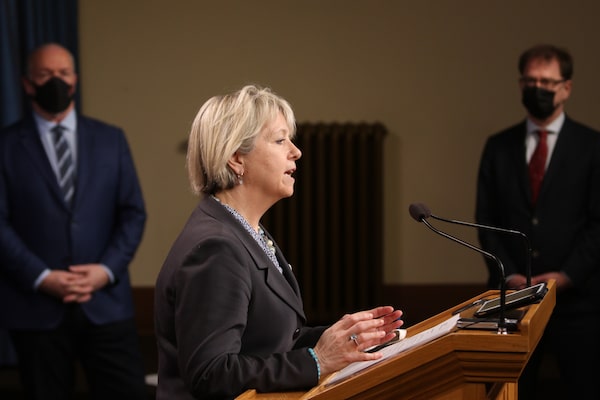
Dr. Bonnie Henry has said vaccines are effective at preventing severe illness and death, but they don’t necessarily stop all transmission, so masks and physical distancing remain important.CHAD HIPOLITO/The Canadian Press
British Columbia’s premier and health minister refused to directly answer questions Wednesday about the government’s contract with Telus, the provider whose call centres for COVID-19 vaccine appointments got off to a chaotic start.
The Opposition Liberals repeatedly asked Premier John Horgan and Health Minister Adrian Dix during question period to release the contract and to provide basic information including its monetary value and the number of staff promised to the centres.
Both Mr. Horgan and Mr. Dix did not provide specifics, but instead repeated earlier remarks that Monday was a “bad day,” when Vancouver Coastal Health was only able to book 369 appointments, but that steps have been taken to improve the situation.
“People have bad days all the time,” Mr. Horgan said. “I’m fairly confident that Wayne Gretzky didn’t score in every game he played in, but he kept getting on the ice and doing the best he could. That’s exactly what we did in Vancouver Coastal Health.”
Mr. Dix called a news conference later on Wednesday to report vast improvements had been made in the vaccine rollout since Monday, when health authorities first started booking appointments for people 90 years and older and Indigenous people 65 and older.
He said the system had caught up to the point where as of noon Thursday, health authorities will start to schedule vaccine appointments for the next age group of people, between 85 and 89 years old, four days earlier than planned.
Canada vaccine tracker: How many COVID-19 doses have been administered so far?
“Our capacity to take appointments is higher today than it was yesterday,” Mr. Dix said. “It shows that while our system had a bad day on Monday, it has responded. Now, we’re determined, ready and able to take the next group of patients early.”
As of 4 p.m. Wednesday, 37,661 people aged 90 and older had been able to make COVID-19 vaccination appointments. He said about 50,000 people in that age group are eligible for COVID-19 shots.
Telus apologized for the rough start at the call centres on Monday, when many people experienced repeated busy signals and messages telling them to call back later.
A statement from Telus said the team’s performance has improved since Tuesday.
The statement says capacity at the call centres was more than doubled and by Wednesday, Telus surpassed the original staffing commitment to the government by 295 per cent.
The Opposition Liberals said only 33 call-takers were originally assigned to Vancouver Coastal – the second-largest authority in the province.
The Liberals asked why the government thought it would be an adequate level of staff as well as who signed the contract and when.
Liberal Renee Merrifield, a member of the legislature for Kelowna-Mission elected last fall, called on the premier to take full responsibility for the “botched” rollout of the system.
“I fully appreciate that accountability ends with me,” Mr. Horgan said. “If that doesn’t meet the bar set by the newly minted member for Kelowna, I apologize to her as well.”
Mr. Dix said that 35,500 appointments have been booked over the past three days. He has previously said about 54,000 people are eligible to book this week.
He said each health authority signed an agreement with Telus to provide call centre capacity under a long-standing master agreement with the company.
“It’s natural that we would turn to an outstanding provider such as Telus to do this,” Mr. Dix said.
The minister added that Telus president Darren Entwistle has “personally” driven the effort over the past two days to make things right.
B.C. reported 531 new cases of COVID-19 on Wednesday and one new death, for a total of 1,394 people who have died from complications of the virus in the province.
There have been 51 new cases of variants of concern. Of the 627 variant cases, 580 are the strain identified in the United Kingdom, 33 are the variant detected in South Africa and 14 are linked to Brazil.
The province confirmed it has started to receive supplies of the Oxford-AstraZeneca vaccine, which will assist with outbreak response in communities and high-risk industries.
There have been two COVID-19 outbreaks in long-term care homes where most residents and staff were vaccinated, which experts say is a reminder of the limits of immunization.
Fraser Health said Tuesday that one resident and one staff member tested positive for COVID-19 at Fleetwood Place, a long-term care facility in Surrey where 88 per cent of residents had been vaccinated.
The outbreak followed one declared Sunday at the Cottonwoods Care Centre in Kelowna, where 11 residents and two staff members tested positive despite 82 per cent of residents being immunized.
Some of the cases at the Kelowna care home are in people who received two doses of the vaccine, provincial health officer Dr. Bonnie Henry said earlier this week.
Dr. Henry said vaccines are effective at preventing severe illness and death, but they don’t necessarily stop all transmission, so masks and physical distancing remain important.
Horacio Bach, a University of British Columbia infectious diseases expert, said older people’s immune systems may take longer than three weeks to produce antibodies or may not produce them at all.
Mr. Bach said no vaccine prevents illness 100 per cent of the time, but the COVID-19 shots have been proven to be safe and very effective against serious illness and hospitalization.
We have a weekly Western Canada newsletter written by our B.C. and Alberta bureau chiefs, providing a comprehensive package of the news you need to know about the region and its place in the issues facing Canada. Sign up today.